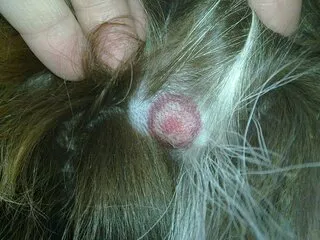German shepherds are well endowed with a rich beautiful coats. The breed does have a thick double coat of fur with the outer coat being coarse, dense, and waterproof while the undercoat is fluffy, soft, and insulates quite well against the cold.
The German shepherd is also a big shedder, shedding all year long but also losing its undercoat in spring and fall; so much shed fur that you may think you have two dogs!
This is known as shedding season or “coat blow,” as they seem to blow their whole coat, They lose their summer coat in fall to make way for a warmer winter coat and their winter coat is shed in springtime to grow a coat that helps to regulate their body temperature by keeping them cooler.
Their coat insulates and protects them. With this excellent “all-weather” coat, you would think that the shepherd wouldn’t have any skin problems.
Quite the opposite is true because German shepherds have skin that is more sensitive than other breeds.
In the following post, I will give you some information about skin problems, causes, and symptoms, as well as how to help with German shepherd skin problems.

For your dog’s vitamin supplement, food, toys, or other dogs product please visit the Sundays for dogs website.
German Shepherd Skin Problems: Symptoms, Causes, and Remedies
German shepherds are more prone to suffering from skin issues. We humans aren’t the only ones who sometimes have skin rashes, dry skin, itching, and burning.
Dogs can have many skin conditions as well. Sometimes the cause is right under our noses and easy to detect, while other times an investigation is in order.
If you have a German shepherd or are considering getting one, check out what’s ahead for some German shepherd skin problems, causes, and symptoms, plus solutions.

Flea dermatitis or flea Allergy in German shepherd
Flea dermatitis is one of the most common skin problems in German shepherds and this becomes a flea allergy in this breed because shepherds are allergic to fleas and flea saliva.
When your pup is bitten it will develop symptoms of inflamed skin and itchy skin that it will constantly lick, bite, chew and rub. They can end up with open sores which can, in turn, lead to a secondary infection.
Prevention is the key to avoiding flea dermatitis by using flea products to repel fleas such as a collar, drops, or pills. Discuss this with your pup’s veterinarian first to make sure the products you choose are safe.
If you end up with a full-blown flea infestation, your whole house will need to be treated preferably by an exterminator. Your shepherd will need a flea bath to rid them of the fleas and don’t forget to wash your pup’s bedding as fleas gather there. Eliminating all fleas is essential.
As well as skin problems, fleas can cause bacterial infections, anemia, and tapeworms.
Allergies
Even though the German shepherd can be fierce-looking and somewhat intimidating, not to mention their loud boisterous bark able to stop one in their tracks, their skin can be quite sensitive.
They are prone to a variety of skin problems and allergies are one of the major causes. Listed below are some allergies that afflict German shepherds and also remedies.
To check your shepherds’ health status or their DNA checks, please visit the Embark vet website for all the help you may need.

German shepherd food allergy
In German shepherds, there is a risk of them developing food allergies. Symptoms can range from dry, flaky skin, excessive itching, red inflamed skin, and often gastrointestinal issues.
Rashes generally occur on the stomach, underarms, carpus, or wrists, and sometimes on the paws.
Oddly the biggest culprit causing allergies in their food is often the meat source. Reactions can be caused by beef, pork, or chicken and by the protein in these meats.
Lamb-based foods may be an alternative or even trying a raw food diet, highly recommended for good health and excellent health of skin and coat.
Gradually changing foods is the only way to ensure your shepherd is consuming a portion of food with the right protein source, plus all of the necessary vitamins, minerals, and important antioxidants, see the best dog food for German shepherds with skin allergies.
To keep them healthy. More natural food is a good choice and one that doesn’t contain additives or artificial ingredients. The fewer ingredients as far as fillers and things you can’t pronounce, the better.
German shepherd environmental allergies
Environmental allergies are caused by allergens in the environment around us. Just as we humans can suffer from seasonal allergies from pollen and grasses along with indoor allergies from dust, so can our best pal, in fact, this is the most common of allergies in German shepherds.
People sometimes become extremely miserable from this malady and our pups can too. Symptoms are itching, dry flaky skin, hair loss, hot spots, sneezing, coughing, and puffy watery eyes.
The rashes can manifest on their stomach, armpits, ears, and around the mouth and eyes. Hot spots can appear on the wrists (carpus), with skin appearing red and raw from your pup constantly chewing, licking and biting, to irritate further. Ear infections can also develop if allergies are left untreated.
Treatment for allergies can range from allergy medications, oral steroids, topical steroids, and baths with shampoos that are specifically made for calming and soothing skin issues, often containing natural ingredients like tea tree oil or Aloe Vera.
Other things you can do to help your pup during allergy season is to walk them later in the day, perhaps when pollen counts aren’t as high.
Vacuum your house more often to eliminate dust mites and also any pollen that is tracked indoors.
Allergies that are airborne will be an issue that will affect your shepherd throughout its life and will worsen with age.
It’s best to have your pup undergo allergy testing if you suspect this so immunotherapy can begin for better control of their allergies.

Bathing
All dogs do need a bath from time to time. They sometimes get into mud or mess outside which requires cleaning before being allowed indoors!
Also, no one likes the smell of their house to announce that you have a dog by the icky “dog” smell, especially when there are guests.
You do, however, have to administer just the right amount of baths. Too many baths can cause many skin issues from dry, flaky skin to rashes because this will decrease the oil that moisturizes your pup’s skin.
Never bathe too often and always use a gentle hypoallergenic shampoo. Dog shampoos that contain too many additives or perfumes can be the cause of skin problems, see the collection of the best dog shampoo for skin allergies.
Diseases
Some skin problems in the German shepherd can also be caused by an underlying disease. One such condition is Cushing’s disease, which can be caused by a tumor on the pituitary gland.
Symptoms are increased appetite, weakness of muscles, thirst, loss of fur, skin infections, and rashes.
Hypothyroidism is another disease where the thyroid, which controls metabolism, is not producing enough thyroid hormone. Symptoms are generally: weight gain, lethargy, ear infections, hair loss, thinning, dull coat, and dry flaky skin.
If your pup has skin issues along with other concerning symptoms make an appointment with their veterinarian. Medication for these diseases usually eliminates skin problems.
German Shepherd skin infection
Any of the above skin conditions can lead to skin infections if they are not addressed. If your pup is scratching enough to develop any open sores, have your veterinarian take a look at your pup’s skin.
These sores can turn into an infection that can even get into the bloodstream if left untreated. Antibiotics are usually prescribed.
Your German shepherd may never develop any type of skin problem, but if you notice red, inflamed skin, itching, scratching, or hair loss, it’s best to consult your veterinarian or they may recommend a veterinary dermatologist if they cannot make a definitive diagnosis.
This will eliminate needless suffering for your German shepherd as well as frustration on your part, and allow you a healthy German shepherd, free of skin problems.